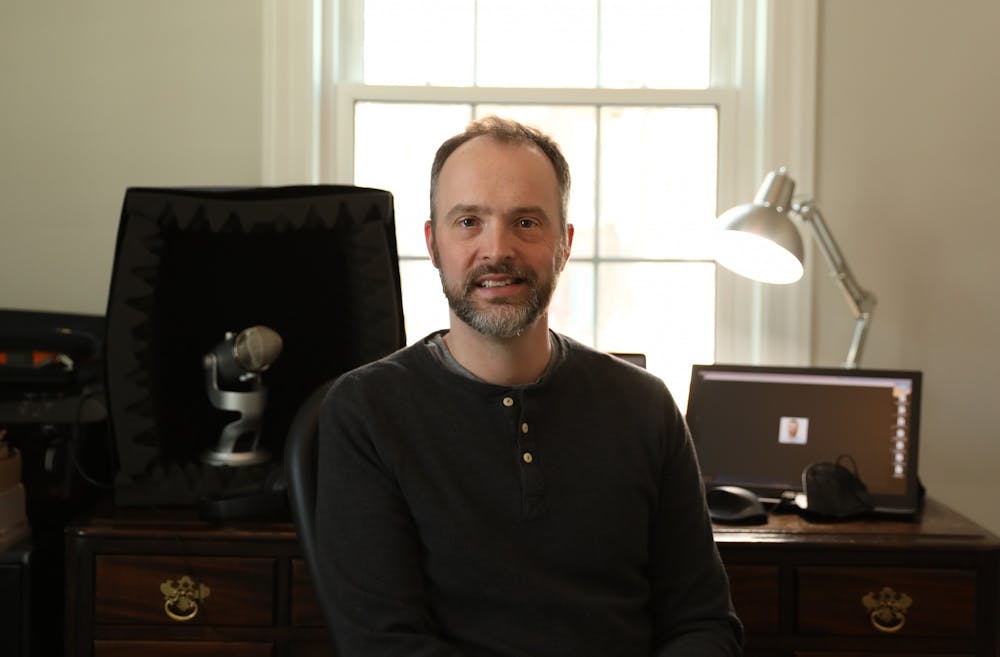To listen to Stephen Hessel's first episode of "Pod Quixote," visit the podcast's website.
Nearly 400 years ago, Spanish novelist Miguel de Cervantes wrote "Don Quixote," a novel that has since become the fifth-most translated book in the world, according to Babbel Magazine, and continues to inspire discussion of modern social issues. Despite its age, one Ball State professor felt inspired to pass along the story's seemingly timeless message to people from Cervantes' work today. Stephen Hessel, Ball State associate professor of Spanish, decided to create a podcast, "Pod Quixote,” to speak to other Cervantes experts.
Hessel first started listening to podcasts about his hobbies during the COVID-19 pandemic, such as Dungeons & Dragons, and felt like he was a part of a community with similar interests as him. He said he wanted to be more active by putting out his own voice, so he decided to take his listening a step further by creating his own podcast about Cervantes' work, including “Don Quixote.”
However, Hessel wasn’t always eager to share his thoughts. In fact, one of the reasons he started his podcast was to give his students a voice and create a community through historical literature. Hessel said he has struggled with feeling voiceless since his childhood, as he grew up with depression and anxiety. However, over time, he found ways to help get him through those challenges. Hessel knew people around him cared about his mental health, which helped him feel like he had a voice.
When Hessel began noticing a change in the overall mood of his classrooms during the pandemic as his students opened up about their mental struggles, he was inspired to not only teach his students historical literature but to use historical literature to teach lessons typically taught outside the classroom.
“The pandemic has changed me as a teacher because it’s allowed me to let my human self show a little bit more than before,” Hessel said. “I think there’s always this idea of professors teaching students. But really, if you look at an effective classroom, we both are learning, and it’s a journey that people are taking together … the pandemic really showed how my students — like everybody else, but my students especially — are suffering.”
For Hessel, the pandemic’s overall effect on his students sparked an “earth-shattering moment” as a teacher, as he realized how students might be facing mental health problems like him. As he did before, he said he turned to historical literature to find the answer. He started connecting Cervantes' work to issues about social injustice, climate change and gender roles, bringing his analyses to his classroom where his students can express how they feel about these issues.
“One of the wonderful things about Cervantes is he provides us with an approach to life that is critical but doesn’t take itself [overly serious], but also on the other side of things, makes light of absolutely everything,” Hessel said.

Associate Professor of Spanish Stephen Hessel's laptop and microphone sit on a desk in his house Feb. 15 near Jackson Street. Hessel records his podcast "Pod Quixote" in his Muncie home. Rylan Capper, DN
Jennifer Rathbun, chair of the Department of Modern Languages and Classics, had the opportunity to work alongside Hessel, in which she saw how he created a passion for himself through studying “Don Quixote.”
“We have this longing for a human connection and understanding what makes us human, what ruins our lives’ value, and Dr. Hessel certainly found his passion in the study of ‘Don Quixote’ and in his podcast,” Rathbun said. “He’s wonderful at sharing that with the students, and that helps them discover their own passion.”
Hessel’s first guest for “Pod Quixote” was Christine Garst-Santos, director of the School of American and Global Studies and associate professor of Spanish at South Dakota State University. During the first episode, they discussed a variety of topics, and Garst-Santos offered further expertise on “Don Quixote,” looking at questions of gender and national identities.
“It felt like a conversation between two people who love Cervantes and ‘Don Quixote,’” Garst-Santos said. “He was a great podcast host [and] had reread many of my articles that we discussed in the podcast, so that was really fun and flattering.”
Hessel and Garst-Santos discussed her work on female characters in “Don Quixote” and how the novel can be used to teach various current topics like the #MeToo movement.
“Dr. Hessel likes to work in that area of, ‘What can this 400-year-old text teach us about our own cultural moment about our own time?’” Garst-Santos said. “I would say we explored a lot of the areas of gender, Cervantes and social media and Cervantes in the MeToo movement.”
Hessel speaks with many guests of different backgrounds and areas of expertise about “Don Quixote” on his podcast. He interviewed Eric Drooker, the artist of the Nov. 15, 2021 New Yorker cover, who created a piece of art of “Don Quixote” titled “The Impossible Dream,” examining climate change.
“I was quite surprised because I figured [a] famous artist who did the front of The New Yorker isn’t going to want to talk to somebody who just started a podcast in the middle of nowhere … the artist himself hasn’t read a lot of theater, he just said the image was powerful, so he used it,” Hessel said.
Rathbun said “Don Quixote” and other classic works of literature remind people of their shared humanity.
“Literature offers us a window into what it means to be human,” she said. “This is very much relevant today — I would say even more so during the pandemic.”
Contact Angelica Gonzalez Morales with comments at agonzalezmor@bsu.edu or on Twitter @angelicag_1107.




